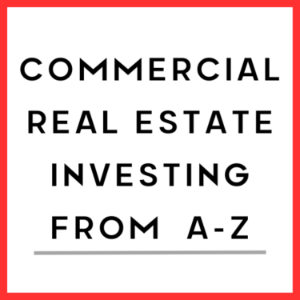
Commercial Real Estate Investing From A-Z
Business & Economics Podcasts
Getting started with Commercial Real Estate Investing, or an experienced investor? This is a weekly podcast on the steps that I take to make my Commercial Real Estate investments (Retail, Office, Self Storage, etc) including successes and lessons learned. We cover advanced techniques for purchasing, operating, and exiting your properties, from the best people in the industry. You will learn everything you need to know about real estate investing. We are based in San Francisco / Silicon Valley and also cover how technology affects Commercial Real Estate, and how you can stay ahead of the game. Support this podcast: https://podcasters.spotify.com/pod/show/best-commercial-retail-real-estate-investing-advice-ever/support (https://podcasters.spotify.com/pod/show/best-commercial-retail-real-estate-investing-advice-ever/support)
Location:
United States
Description:
Getting started with Commercial Real Estate Investing, or an experienced investor? This is a weekly podcast on the steps that I take to make my Commercial Real Estate investments (Retail, Office, Self Storage, etc) including successes and lessons learned. We cover advanced techniques for purchasing, operating, and exiting your properties, from the best people in the industry. You will learn everything you need to know about real estate investing. We are based in San Francisco / Silicon Valley and also cover how technology affects Commercial Real Estate, and how you can stay ahead of the game. Support this podcast: https://podcasters.spotify.com/pod/show/best-commercial-retail-real-estate-investing-advice-ever/support (https://podcasters.spotify.com/pod/show/best-commercial-retail-real-estate-investing-advice-ever/support)
Twitter:
@steffbold
Language:
English
Website:
https://montecarlo.home.blog/
Email:
steffbold@gmail.com
100% Bonus Depreciation & Other Tax Benefits in Real Estate
Duration:00:23:32
How I Made 25% IRR on My Absolutely Worst Investment!
Duration:00:12:01
Why Are Car Washes a Great Investment? Why is Now a Good Time to Buy? What Should Investors Keep in Mind?
Duration:00:20:05
Capital Crunch or Capital Flow? The State of Syndications & The Real Estate Market
Duration:00:20:44
Lessons Learned on Our First Deal in 2025
Duration:00:20:10
SEC Traps & GP/LP Structures for Infinite Cashflow
Duration:00:24:54
What Are The Pros And Cons of Office, Retail, and Industrial? How To Overcome Fear in Investing?
Duration:00:26:14
The CRE Playbook: Goals, Asset Classes & Agent Roles
Duration:00:21:11
Protecting Your Investment: Vetting Syndicators & Operators the Right Way
Duration:00:18:03
Syndications & Funds: Behind the Deal
Duration:00:21:48
Self Storage From A-Z & Tips for Success
Duration:00:23:04
100% Financing with SBA? Can You Get an SBA Loan for Your Development?
Duration:00:12:54
How to Buy Real Estate With 10% Down? How do SBA Loans Work?
Duration:00:17:46
Which Markets Are Growing Fast & Why?
Duration:00:11:47
California Fires: Opportunities in Real Estate? Real Estate Outlook for 2025
Duration:00:17:20
How to Negotiate Loans & Manage Lender Relationships + Market Updates + Lessons Learned
Duration:00:17:08
Retail Trends & How to Have Successful Pop Ups in Your Center
Duration:00:18:49
How to Work With Cities & Tips on Repurposing Real Estate
Duration:00:08:48
Navigating the Current Economy and Commercial Real Estate Market: Expert Insights
Duration:00:18:09
What Are The Downsides of Industrial Investing?
Duration:00:16:22